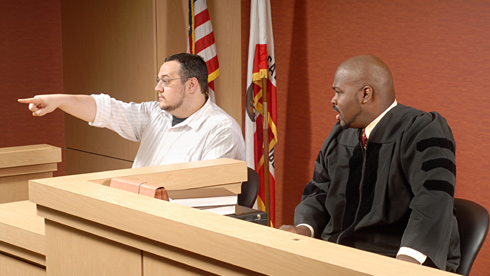It was Marcus Aurelius who said, “Everything we hear is an opinion, not a fact. Everything we see is a perspective, not the truth.” This quote should be branded onto the front panel of every jury box in the country. It is a reminder that the absolute truth is almost impossible to uncover.
One example of a perspective, which leads to belief, is eyewitness testimony. In our modern justice system, the eyewitness to a crime or event is often the checkmate that lawyers need to deal with in defending their client. But how can eyewitness testimony be valued so much when it relies on a person’s interpretation of an event?
While eyewitness testimony can be the selling point in a trial, it can also do more to muddy the waters by providing inconsistent or blatantly incorrect information to the jury. In some cases testimony from an eyewitness may be stricken from the record by a judge. In extreme cases, an innocent person may be convicted of a crime he or she didn’t commit.
Problems with Eyewitness Testimony
Although many people claim that the eye is an organic camera and that the recorded information can be recalled at any time, psychologists would argue differently. Yes, the eye captures images, but the optic nerve sends the image to the brain, where the viewer, according to his or her own personal ideals or philosophies then interprets it. A person who is biased is likely to misinterpret visual cues to match their bias.
In addition to misinformation caused by personal belief, psychologists have determined that memories are not simply recalled, but reconstructed. And they don’t always run linearly. According to memory researcher Oliver Hardt, every time we retell a memory we inadvertently infuse information from our current environment into that memory. Sometimes we add details to an event that didn’t happen or we forget in what order they happened. Even physical attributes such as the clothing a person wore or their facial features can change. Over time, memories can get so mixed up that they can no longer be trusted.
Implications of Corrupt Eyewitness Testimony
An eyewitness who steps into the witness box holds the jury’s full attention, as well as, that of the audience. A confident witness can be quite dangerous to a case. Even if the information is incorrect, a witness’ confidence can make a jury believe they are hearing an undeniable truth. And once information is presented to a jury it may be hard to disregard it.
Science and Memory Retrieval
Psychologists cite two main reasons that eyewitness testimony is unreliable:
Unconscious transference: This is something that happens when the mind is inundated with conflicting facts or images just after a high stress event. We have a tendency to ‘mix up’ where we saw someone or what happened during a crime as opposed to what we did just before it. We see people at the crime scene that weren’t there.
Memory decay: The time between the event and when we are asked to intervene can make a huge difference in what we remember seeing. As time progresses, so do our memories of the event. Just as you wake up after a nightmare with it fresh in your mind, through the day it diminishes until we don’t remember exact details. As we’re exposed to police officers, lineups, and daily life we can forget the reality of an event.

